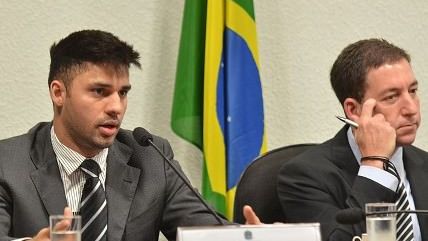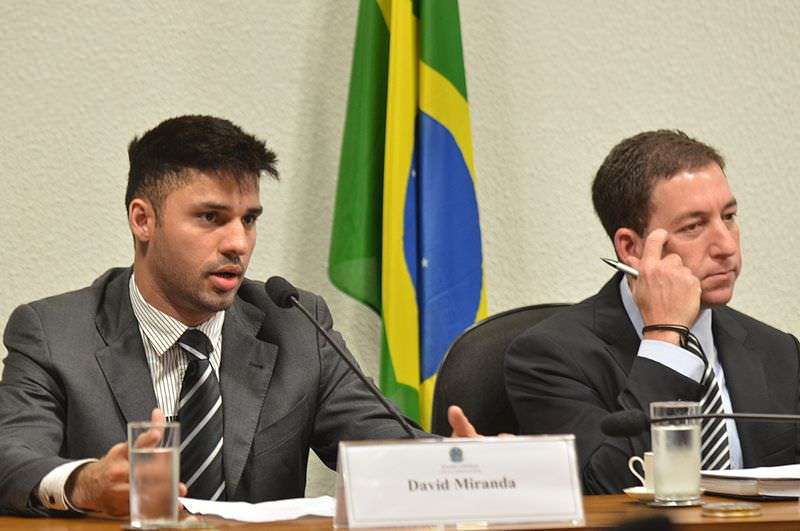British Court: Detention of Glenn Greenwald's Partner Was Legal


Last August, British authorities at London Heathrow Airport detained David Miranda. Miranda is the partner of Glenn Greenwald, the journalist who has been reporting on the information leaked by NSA whistle-blower Edward Snowden.
Miranda had carried documents from Rio de Janeiro, where he lives with Greenwald, to journalist Lauren Poitras in Berlin. He was detained for nine hours on his return trip, and was found to be carrying documents on encrypted USB sticks. Under the Terrorism Act of 2000, nine hours is the longest that someone can be detained.
Today, a British court ruled that Miranda's detention was legal despite the fact it noted that the detention was "an indirect interference with press freedom."
Writing at The Intercept, Greenwald points out that the British government argued that reporting on the information leaked by Snowden was "tantamount to 'terrorism,'" and that the U.K. has a far from laudable record when it comes to press freedom:
It should surprise nobody that the UK is not merely included in, but is one of the leaders of, this group of nations which regularly wages war on basic press freedoms. In the 1970s, British journalist Duncan Campbell was criminally prosecuted for the crime of reporting on the mere existence of the GCHQ, while fellow journalist Mark Hosenball, now of Reuters, was forced to leave the country. The monarchy has no constitutional guarantee of a free press. The UK government routinely threatens newspapers with all sorts of sanctions for national security reporting it dislikes. Its Official Secrets Act makes it incredibly easy to prosecute journalists and others for disclosing anything which political officials want to keep secret. For that reason, it was able to force the Guardian to destroy its own computers containing Snowden material precisely because the paper's editors knew that British courts would slavishly defer to any requests made by the GCHQ to shut down the paper's reporting.
Greenwald then goes on to rightly point out that the British government is trying to halt reporting on the NSA and GCHQ's mass surveillance not because of national security concerns, but because the reporting is prompting a debate that British officials would rather not have:
In sum, the UK Government wants to stop disclosure of its mass surveillance activities not because it fears terrorism or harm to national security but because it fears public debate, legal challenges and accountability. That is why the UK government considers this journalism to be "terrorism": because it undermines the interests and power of British political officials, not the safety of the citizenry. I've spent years arguing that the word "terrorism" in the hands of western governments has been deprived of all consistent meaning other than "that which challenges our interests", and I never imagined that we would be gifted with such a perfectly compelling example of this proposition.
Greenwald writes that Miranda plans to appeal the British court's ruling.
Read J.D. Tuccille's blog post "Is Embarrassing the Government Terrorism? British Politicians Think So." here.
Editor's Note: As of February 29, 2024, commenting privileges on reason.com posts are limited to Reason Plus subscribers. Past commenters are grandfathered in for a temporary period. Subscribe here to preserve your ability to comment. Your Reason Plus subscription also gives you an ad-free version of reason.com, along with full access to the digital edition and archives of Reason magazine. We request that comments be civil and on-topic. We do not moderate or assume any responsibility for comments, which are owned by the readers who post them. Comments do not represent the views of reason.com or Reason Foundation. We reserve the right to delete any comment and ban commenters for any reason at any time. Comments may only be edited within 5 minutes of posting. Report abuses.
Please to post comments


Of course it was legal. The British government is bound to respect peoples' right only by a gentlemen's agreement that can be superceded by whatever expedient Parliament thinks is absolutely necessary this week.
This is in stark contrast to the US, which has a written Constitution that elected and appointed officials must swear to uphold before they can ignore it.
OT: She's harnessed the power of these foul beasts. It can only be a matter of time before she unleashes her adorable plan.
Oh dear Lord! Run AWAY!
What the rabbits don't know is she has a dozen very hungry Dobermans at home.
Today, a British court ruled that Miranda's detention was legal despite the fact it noted that the detention was "an indirect interference with press freedom."
Do the British have freedom of the press codified in law anywhere?
Nope, just precedent, as far as I know.
Nothing that stops the government from doing what it wants. It's an unwritten constitution that keeps getting more unwritten.
I'm glad we at least have an actual Constitution that has to be actively ignored.
Well, we now can say that our written constitution, coupled with the common law system, seemed to protect freedoms and limit government for longer than the English system, with its unwritten constitution.
Perhaps what we need is the next step in the series--none, unwritten, written, what? Stone monolith? Stonehenge?
Yes, ProL. Yes.
[Spoken In ancient times
Hundreds of years before the dawn of history
Lived a strange race of people. . .the Druids
No one knows who they were or what they were doing,
But their legacy remains
Hewn into the living rock. . .of Stonehenge.]
Stonehenge! Where the demons dwell
Where the banshees live and they do live well.
Stonehenge! Where a man's a man
And the children dance to the Pipes of Pan.
Hey!
Stonehenge! 'Tis a magic place
Where the moon doth rise with a dragon's face.
Stonehenge! Where the virgins lie,
And the prayers of devils fill the midnight sky.
And you my love, won't you take my hand?
We'll go back in time to that mystic land,
Where the dew drops cry and the cats meow.
I will take you there, I will show you how.
Oh!
And oh how they danced,
The little children of Stonehenge
Beneath the haunted moon
For fear that daybreak might come too soon.
And where are they now?
The little children of Stonehenge.
And what would they say to us?
If we were here. . .tonight
It's sort of vague but the Bill of Rights 1689 does call for the protection of freedom of speech. And the Bill of Rights of 1689 is still binding legislation. The main problem is that subsequent legislation has modified rights listed in that law (eg the right to bear arms) so who knows what's been enacted since.
I'm fairly sure that the original clause was not limited to Members of Parliament even tough that is pretty much what this clip suggests.
I've spent years arguing that the word "terrorism" in the hands of western governments has been deprived of all consistent meaning other than "that which challenges our interests"
Bingo, Glenn. Bingo.
1) Miranda's detention - ironic
2) Of course they ruled this way.
3) Just proves Britain's still even more fucked than the US. For now.
4) If he didn't want to get arrested, he shouldn't have been trolling the implied promise of that sexy, sexy flash drive/disc/password/code/laptop they thought he must be carrying. Talk about bringing all this on yourself!
Fuck Great Britain's govt. Even more than the US govt.
If he'd been detained in the US, you hope he would have at least been read his rights.
Sure he would. The feds have taken great pains to make sure that the full text of the Miranda rights are printed on the inside of each black bag they slip over a detainee's head.
Enemy combatants don't have rights. Do you libertarians WANT us to all be blown up?